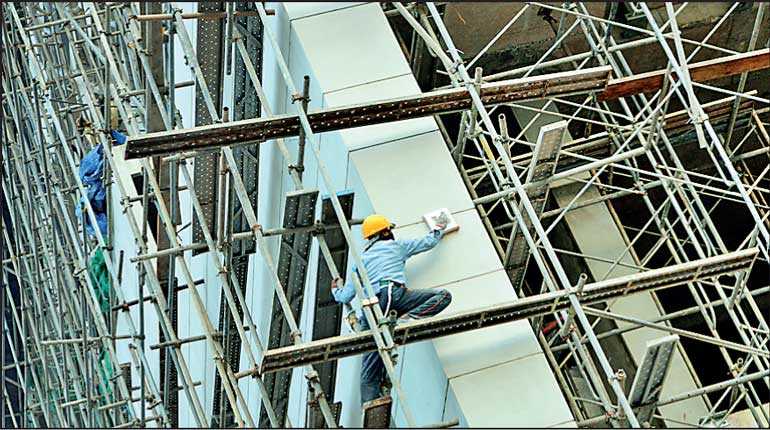Tuesday Feb 17, 2026
Tuesday Feb 17, 2026
Thursday, 12 March 2020 00:00 - - {{hitsCtrl.values.hits}}

By Uditha Jayasinghe
Construction industry stakeholders yesterday appealed to the Government to pay an estimated Rs. 400 billion owing to hundreds of companies, many of them Small and Medium Enterprises (SMEs), and suspend deducting liquidated damages from overextended projects to assist the cash-starved sector.
The Ceylon Institute of Builders (CIOB) said they had already appealed for the Government to implement a suspension of deductions from contractors for liquidated damages, as many projects had been overextended due to issues beyond the control of contractors.
“We have raised this issue with top members of the Government. Construction companies have been badly affected by a slew of problems, including the non-payment of dues and difficulty in obtaining raw material at competitive prices. As a result, projects have not been completed on time. However, most contracts do not have provisions for extensions or accommodation of price increases. This is a major issue. Deduction of liquidated damages in such a situation is deeply problematic for many companies and we have appealed for this cost to be either refunded or suspended,” CIOB Vice President Ruwan de Silva told Daily FT.
Sri Lanka’s construction industry includes about 3000 companies, with the majority being SMEs. De Silva explained that many of them were struggling due to multiple issues worsened by the deductions of liquidated damages that has continued from 2016 to date.
“There are around 3000 active contractors operating in all nine provinces. Most of them are Small and Medium Entrepreneurs (SMEs) who work with very small margins and with limited financial support. Most of the contractors work with bank loans and on leasing facilities, which leaves them with limited room to absorb shocks.”
De Silva pointed out that this situation has been exacerbated by non-payment of dues by the Government, which is estimated to owe about Rs. 400 billion to construction companies countrywide.
“This situation has aggravated the existing financial burden further and they are struggling to meet their cash flow and liquidity problems leading to a crisis of even struggling to feed their families,” he noted.
The National Construction Association of Sri Lanka (NCASL) representatives also echoed this view appealing for the Government to settle bills submitted before 31 December 2019 before the April New Year period.
“We understand that the Government was unable to get parliamentary approval to increase the debt ceiling on the Vote on Account (VoA). However, the construction industry is in dire need. We have had multiple meetings with the President, the Prime Minister and top Finance Ministry officials but have not received any relief so far. They understand our plight, and have acknowledged that these dues need to be paid but are unable to assist us in a tangible way. We hope they can resolve this issue soon,” NCASL First Vice Chairman Susantha Liyanarachchi said.
Outstanding payments were for construction done on the “Nearest School Best School” project, provincial road construction done by the Road Development Authority (RDA) and Divisional Secretariats, construction of provincial schools and building of highways.